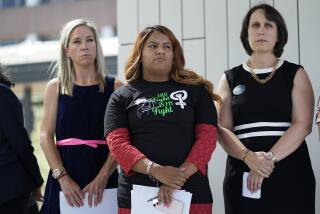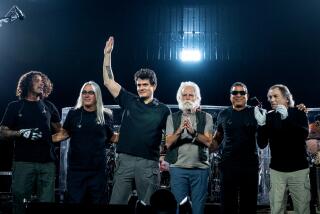In the Fyre Fest documentary battle, will Hulu or Netflix come out on top?
Take one for the team.
That’s what Andy King had been asked to do. For weeks, Fyre Fest — a supposed new and luxurious Bahamian music festival that had attracted the interest of thousands of Instagram-loving millennials — had been on the brink of collapse. King, a 57-year-old respected event producer who has hosted charity functions for Leonardo DiCaprio and environmentally friendly Oscar parties, had flown down to Great Exuma in an attempt to save the much-hyped event.
For the record:
3:50 p.m. Jan. 16, 2019An earlier version of this post said that festival-goers Seth Crossno and a friend each had paid $13,000 to attend the Fyre Fest (the subject of new Netflix and Hulu documentaries). Crossno said he paid $4,500 and that he did not know how much his friend spent.
He did so at the request of his protégé, Billy McFarland. For years, King had served as the 20-something’s mentor, helping the would-be entrepreneur launch a credit card that promised exclusive benefits for wealthy New Yorkers. But when King arrived on the island, things were far worse than he’d anticipated. McFarland told him that four 18-wheeler trucks filled with Evian water were held up in customs, and the only way to get them out was to pony up $175,000 in cash — money he didn’t have.
So, King said, McFarland asked him — “our wonderful gay leader” — to perform oral sex on the customs official to “save this festival.”
King was momentarily baffled but quickly found himself driving home, taking a shower and gurgling some mouthwash, fully prepared “to take one for the team.”
No, he never went through with it, but that’s how desperate things were behind-the-scenes in the weeks leading up to Fyre Fest, the April 2017 music festival that will go down in the history books as the epitome of an epic fail. The event captivated thousands from afar as the mess unfurled in real time on Twitter — all the music acts pulled out, “luxe accommodations” were actually FEMA disaster tents, guests got locked in an airport — and generated enough interest that both Netflix and Hulu greenlighted documentaries about it.
The Netflix project, “Fyre,” had long been slated for a streaming and limited theatrical release on Friday — but on Monday, Hulu ignited the streaming wars by dropping its own film, “Fyre Fraud,” without warning.
The Hulu project instantly became a trending topic, and celebrities like Chrissy Teigen began live-tweeting it: “I love this fyre movie,” she wrote. “Oh man there’s just so much that went wrong, it’s fascinating.”
The news came as a surprise to Chris Smith, the director of “Fyre” and a veteran documentary director (“American Movie,” “Jim & Andy: The Great Beyond”). He’d known the Hulu project existed — it was announced as a planned docuseries in 2017 — but wasn’t aware it was completed.
Hulu wouldn’t comment on its release strategy, but Jenner Furst and Julia Willoughby Nason — the husband-and-wife directorial team behind “Fyre Fraud” — said the company felt that “if viewers start here first, it would be a powerful way to get things started.”
ANALYSIS: What the Fyre debacle says about the state of the modern music festival »
On Monday night, Furst — who has worked on television docuseries about Trayvon Martin and Kalief Browder — said he was elated with the response the film had gotten on Twitter.
“Who wouldn’t want to have a day on which your film is trending on Twitter and celebrities are tweeting about it?” he said. “It’s amazing that everyone dropped everything they were doing, including Chrissy Teigen, to watch, and I think it shows the appetite for this content. Which is why we have a collegial attitude with the Netflix team. Streaming wars — that’s not us.”
Nonetheless, a flame war has commenced between the two documentary camps. Hulu has been touting the fact that its film features an exclusive interview with McFarland — the creator of the fest, who is currently serving six years in prison for scamming festivalgoers and contractors out of millions. But Smith is quick to point out that he could have had McFarland in his doc too — for a price.
“Billy told us he was getting an offer for $250,000 and didn’t want to work with them, so he’d work with us if we paid him $125,000,” the filmmaker recalled. “It was hard, because we wanted the interview, but ethically, we just feel like it wasn’t right for him to benefit when other people had been hurt by his actions.”
Furst and Nason acknowledged that they did pay McFarland to license footage and indemnify the production from his potential claims of defamation. They denied that the amount was $250,000 but would not say how much McFarland was paid.
“I find it a little curious that we’re being asked if we have an ethical problem when the Netflix project was produced by Jerry Media, one of the companies that ran social media for Fyre and deleted negative comments on the festival’s Instagram page,” Furst said.
In a statement, the “Fyre” filmmakers said they joined forces with Jerry Media because they wanted access to the company’s wealth of film footage, noting that “at no time did they, or any others we worked with, request favorable coverage in our film, which would be against our ethics.”
Beyond the tit-for-tat, the two documentaries do employ relatively different artistic strategies in tackling the debacle that was Fyre Fest. The Netflix project trains its lens on the background players — like King and other event coordinators, producers, designers and caterers — who were hired to pull off a massive music festival in six months. While the Hulu film follows the same basic timeline, it goes into less on-the-ground detail, instead focusing on bigger-picture commentary about what the implosion of the festival says about millennial culture.
The festival infamously became a viral sensation after it launched with a glamorous promotional video that featured models Bella Hadid and Emily Ratajkowski frolicking on the clear blue shores of a remote, private island “once owned by Pablo Escobar,” popping bottles of Champagne on yachts and wearing barely there bikinis. The January 2017 video was shared by dozens of social media influencers, including Kendall Jenner, and inspired a handful of FOMO-crazed youths to shell out thousands for the promise of private jet rides, a million-dollar treasure hunt on the beach and alcohol-stocked seaside villas.
“Julia and I are older millennials who experienced 9/11 and saw the Bush and Obama and Trump presidencies,” said Furst. “As millennials, this story resonated for us, but we were adults when it happened, so our perspective was obviously that this was a funny story that had a lot of amazing details that are laugh-out-loud hilarious. It was also a cautionary tale about the apathy out there that social media has instilled in a lot of people.”
Smith, meanwhile, said he was more interested in the “human story,” focusing on the individuals whose livelihoods have been stripped from them as a result of working on Fyre Fest.
“I think the thing that surprised me most is how much I liked and cared for the people that I met that got wrapped up in this,” he said. “Going into it, I was worried that it was going to be a movie about bad people doing bad things. And in the end, I found quite the opposite. I found a lot of really compassionate, hard-working, thoughtful individuals that were doing their best to do try to fulfill what they were hired to do.”
Woodstock was the most famous, successful festival in history and there were 1000 cars stuck on the highway ... but social media didn’t exist.
— Andy King
While McFarland is doing time for his crimes — and has been ordered to pay back over $27 million to his investors — both films call into question just how culpable his collaborators were in moving forward with an event they knew was laden with problems. King, who said he was viewed as the “Billy whisperer,” acknowledged he feels “personally responsible” for convincing employees to stay who would have otherwise walked away.
“I was there assuring everybody that this festival would happen when they wanted to pull the plug,” he said. “I kept saying, ‘Don’t worry. I have never been part of a project that didn’t happen.’ And I honestly thought it would happen. Woodstock was the most famous, successful festival in history and there were 1,000 cars stuck on the highway, people dying of overdoses, mudslides — but social media didn’t exist.”
King said he participated in the “Fyre” doc because he was eager to dissuade the notion that it was put on by a bunch of scammers. In an interview, he pointed out that several of the music acts “were a 10-minute plane away” and said the cruise ship set to host 400 of the guests would have alleviated housing concerns — but it couldn’t dock due to bad weather.
“If they hadn’t taken pictures of those damn cheese sandwiches,” he lamented, referring to an image of a pathetic-looking piece of bread with sliced cheese that circulated on the internet. “I saw two drunk kids and told them, ‘You need to eat something,’ so I got them those. And the next thing I know, there are 300 kids in line to get a cheese sandwich, and they’re all taking pictures of it. No one took pictures of the jumbo shrimp or mahi-mahi being marinated for dinner later.”
One of the guests who was tweeting was Seth Crossno, a festivalgoer featured in both “Fyre” and “Fyre Fraud.” After the event ended, Crossno — who had paid $4,500 to go to the festival — and his friend sued McFarland for damages and were awarded $5 million by a North Carolina judge last June.
“I laugh about it now but it really was a dangerous situation,” Crossno said of the festival. “We were in another country without proper medical supplies. Apparently Billy has a plan to get us the $5 million, but I don’t know if we will get it.”
Randall Jackson, McFarland’s defense attorney, did not respond to a request for comment for this story.
Crossno spoke more positively of his experience with the Netflix project, noting that “Chris seemed like a very natural director.”
“The Hulu doc,” he said, “felt like their take is that influencers and social media is really to blame for the whole thing.
“And while they do interview Billy, it’s basically like they didn’t even have him, because he barely answers anything,” he continued. “What good is an interview if he doesn’t answer any questions?”
The directors of “Fyre Fraud” disagreed with that assessment, with Furst arguing that they “literally excoriate [McFarland] for 90 minutes and don’t let him get away with anything.”
“We went in knowing we were going to be fed a lot of lies and a lot of trickery, but you have to be able to sit and comport yourself with people who have done heinous things in a way that allows them to open up,” said Nason.
“We didn’t want to let someone get away with word salad,” added Furst. “But it would be very hard to tell a story like this without getting the perspective of the person who organized it. There were a lot of different portrayals of him, and it felt like from square one, we wanted to hear from the guy who was under fire.”
Crossno, for one, said he feels certain McFarland will stage a comeback after he serves his time. “This is gonna be another ‘Wolf of Wall Street,’” he surmised.
As both documentaries show, the Fyre Fest creator launched another alleged ticket-selling scam while he was out on bail — and now reportedly owes even more money to those he sold allegedly bogus tickets to for events like the Met Gala and Coachella.
But even those closest to McFarland still have conflicting feelings about him. Up until the convict reported to prison last fall, his old mentor, King, was still in communication with him. They had a sit-down where King expected McFarland to apologize and say he wanted to do right by those he’d harmed — but there was no such admission.
And yet, to the question of whether he’d cut ties with McFarland, King said with a sigh: “No, I’m not done with him.”
“I know — I’m Uncle Whackjob,” he continued. “But I grew up in New Jersey, he grew up in New Jersey. We come from a preppy background. Half my friends have sons his age. I didn’t have somebody to mentor me at that age. He’s not a horrible guy. He has hurt a lot of people. Will I probably go visit him someday? Yeah, I will probably. And maybe that’s the closure I need.”
Follow me on Twitter @AmyKinLA
More to Read
Only good movies
Get the Indie Focus newsletter, Mark Olsen's weekly guide to the world of cinema.
You may occasionally receive promotional content from the Los Angeles Times.











